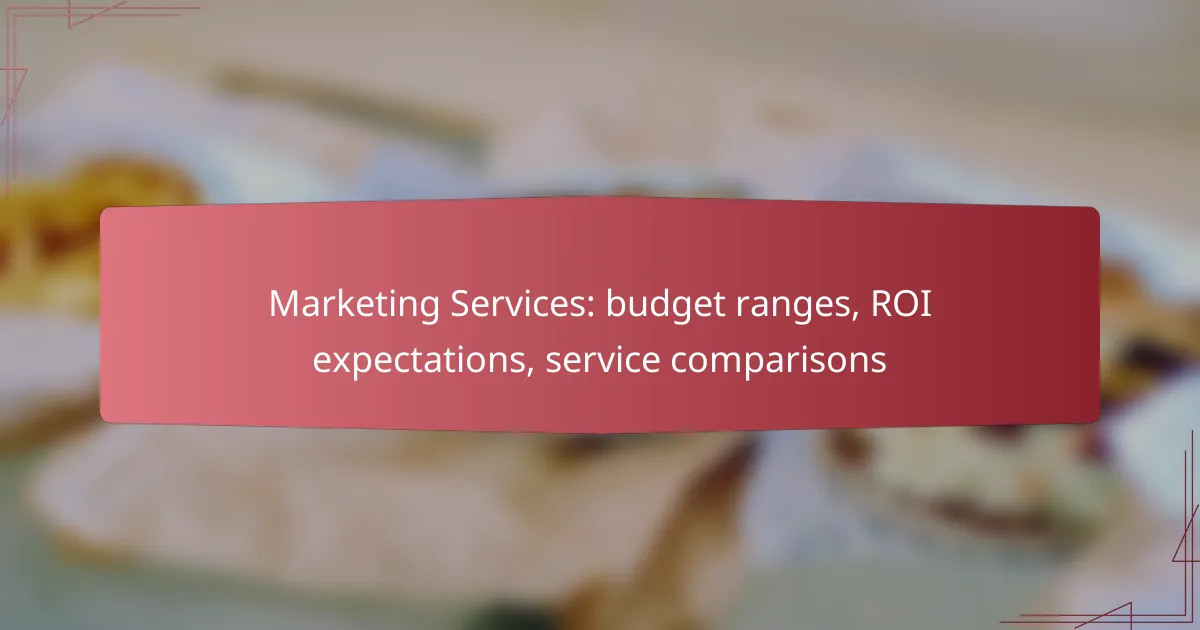Marketing services in London present a diverse landscape of budget ranges and ROI expectations, tailored to the unique needs of businesses. Small enterprises may invest a few thousand pounds annually, while larger companies often allocate substantial budgets for comprehensive strategies. Understanding the effectiveness and costs associated with various marketing approaches is crucial for businesses to align their goals with their financial capabilities.
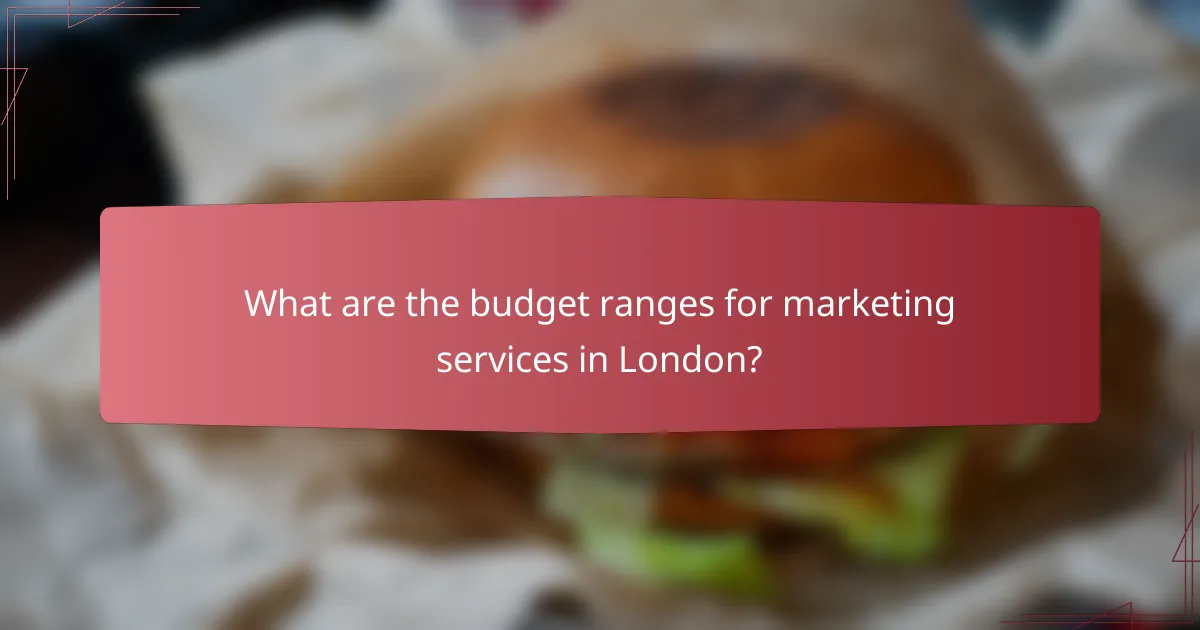
What are the budget ranges for marketing services in London?
In London, marketing service budgets vary significantly based on the size and needs of the business. Small businesses may spend a few thousand pounds annually, while larger enterprises can allocate hundreds of thousands to millions for comprehensive marketing strategies.
Small business marketing budgets
Small businesses in London typically allocate between £5,000 and £20,000 annually for marketing services. This budget often covers essential services such as social media management, basic SEO, and local advertising. Prioritizing cost-effective strategies like content marketing and community engagement can yield significant returns on investment.
When planning a small business marketing budget, focus on measurable outcomes. Set clear goals and track performance to ensure that every pound spent contributes to growth.
Mid-sized business marketing budgets
Mid-sized businesses generally invest between £20,000 and £100,000 per year in marketing services. This range allows for a more diverse approach, including digital marketing, email campaigns, and targeted advertising. Companies in this category should consider a mix of traditional and digital channels to maximize reach and engagement.
It’s crucial for mid-sized businesses to analyze their ROI regularly. Implementing analytics tools can help refine strategies and allocate resources effectively, ensuring the marketing budget is used efficiently.
Enterprise marketing budgets
Enterprise-level organizations often have marketing budgets exceeding £100,000, with some spending millions annually. These budgets support extensive campaigns, advanced analytics, and multi-channel strategies, including international marketing efforts. Enterprises should ensure their marketing strategies align with overall business objectives to justify these significant investments.
For enterprises, a well-structured budget is essential. Establishing clear KPIs and regularly reviewing performance metrics can help in making informed adjustments to marketing strategies, ultimately enhancing ROI.
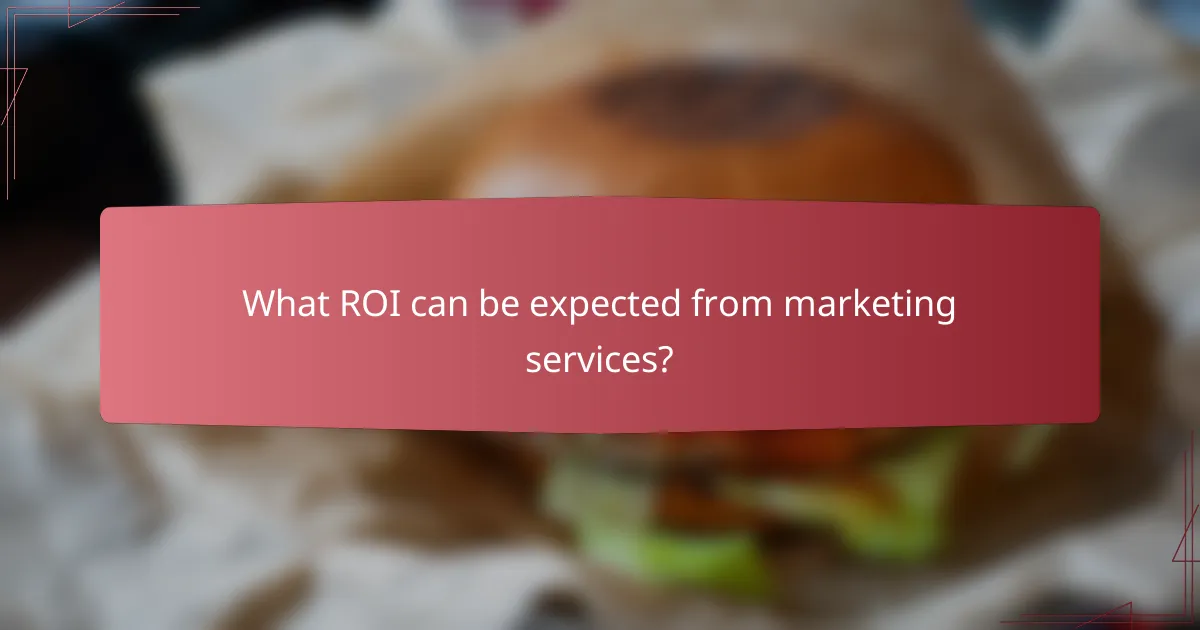
What ROI can be expected from marketing services?
The return on investment (ROI) from marketing services varies widely based on the type of marketing employed and the specific strategies implemented. Generally, businesses can expect a range of returns, with digital marketing often yielding higher ROI compared to traditional methods.
Typical ROI for digital marketing
Digital marketing typically offers a higher ROI, often ranging from 300% to 500% depending on the strategy used. Techniques such as pay-per-click (PPC) advertising, social media marketing, and email campaigns can drive significant traffic and conversions.
For instance, businesses investing in PPC advertising may see returns of $2 to $4 for every dollar spent. It’s crucial to continuously analyze performance metrics to optimize campaigns and maximize returns.
ROI expectations for traditional marketing
Traditional marketing methods, such as print ads, television commercials, and direct mail, usually yield lower ROI, often between 100% to 300%. These methods can be effective for brand awareness but may not directly translate to immediate sales.
For example, a company spending on a television ad might expect to see a return of $1.50 to $2.50 for every dollar invested, depending on the audience reach and engagement. Businesses should carefully assess their target demographics and choose the right channels to enhance effectiveness.
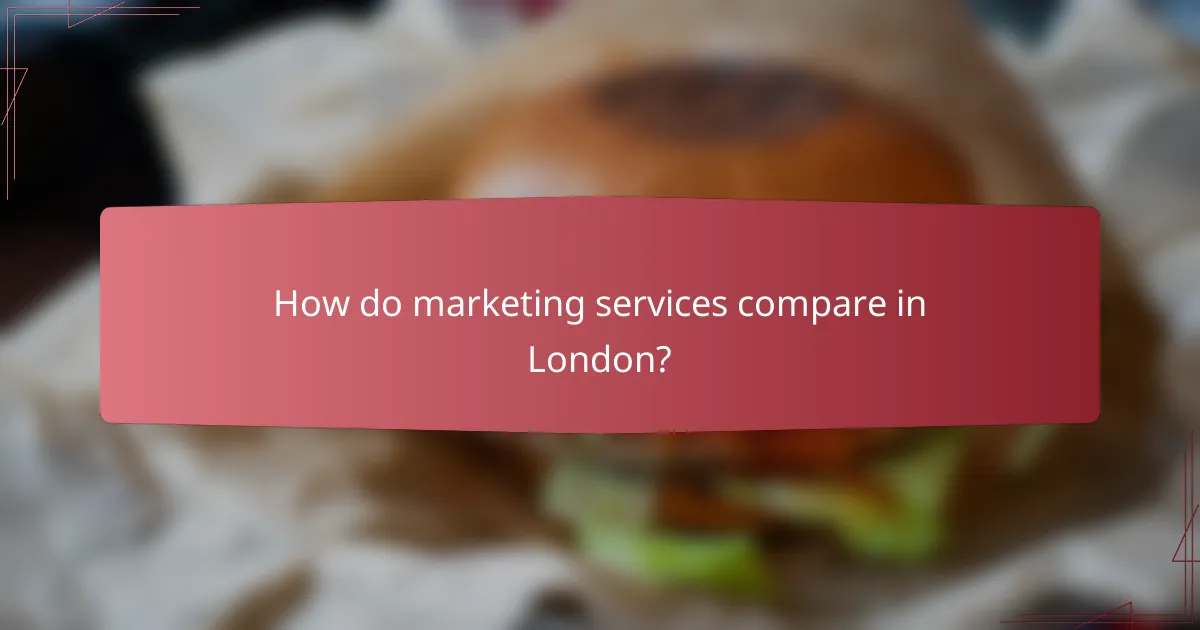
How do marketing services compare in London?
Marketing services in London vary significantly in terms of cost, effectiveness, and strategic focus. Businesses must consider their specific goals and budget constraints when choosing between different marketing approaches.
SEO vs PPC services
SEO (Search Engine Optimization) and PPC (Pay-Per-Click) services serve different purposes in digital marketing. SEO focuses on improving organic search rankings over time, while PPC provides immediate visibility through paid ads on search engines.
In London, SEO services typically range from a few hundred to several thousand pounds per month, depending on the complexity of the campaign. PPC costs can vary widely based on competition and keywords, often requiring a budget of hundreds to thousands of pounds monthly to achieve meaningful results.
When choosing between SEO and PPC, consider your timeline and budget. SEO is a long-term investment that builds sustainable traffic, while PPC can deliver quick results but requires ongoing funding. A balanced approach often yields the best outcomes.
Social media marketing vs content marketing
Social media marketing and content marketing are both essential strategies, but they differ in execution and goals. Social media marketing focuses on engaging audiences through platforms like Facebook and Instagram, while content marketing emphasizes creating valuable content to attract and retain customers.
In London, social media marketing costs can range from a few hundred to several thousand pounds per month, depending on the platforms and level of engagement. Content marketing often involves similar costs, with additional expenses for content creation, which can range from £100 to £1,000 per piece, depending on quality and complexity.
To maximize effectiveness, businesses should integrate both strategies. Use social media to promote content and engage with followers, while content marketing can enhance brand authority and drive traffic. Avoid neglecting either approach, as they complement each other in building a strong online presence.
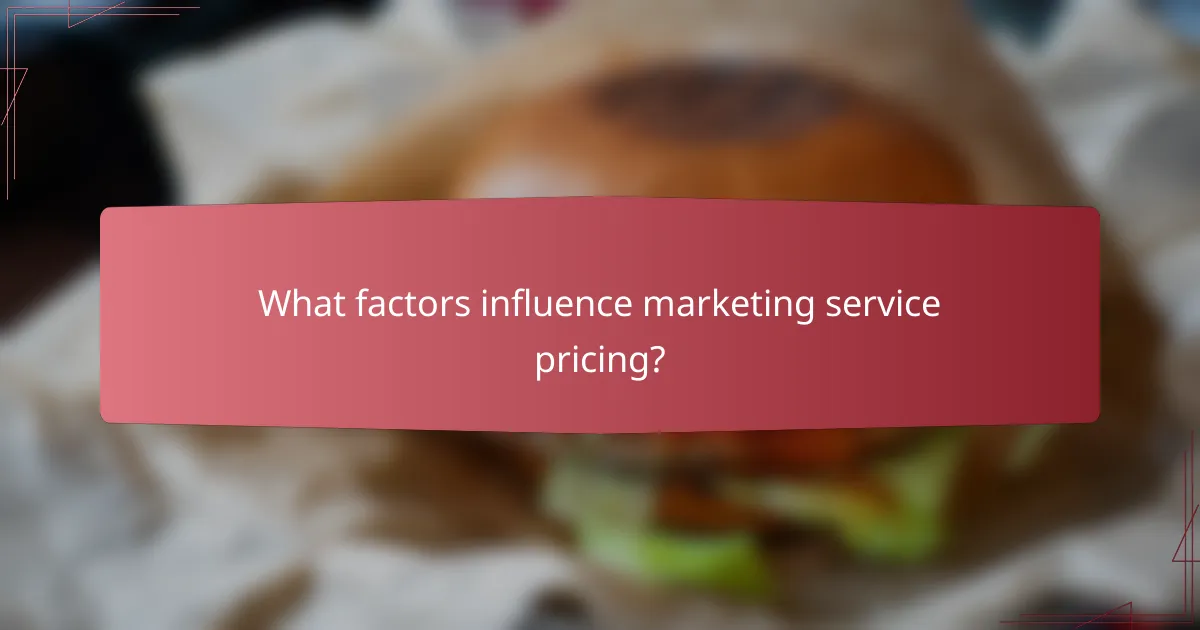
What factors influence marketing service pricing?
Marketing service pricing is influenced by various factors including service complexity and agency reputation. Understanding these elements can help businesses budget effectively and set realistic ROI expectations.
Service complexity
The complexity of a marketing service directly impacts its pricing. Services that require advanced strategies, such as multi-channel campaigns or in-depth analytics, typically cost more than basic offerings like social media management or email marketing.
For example, a comprehensive digital marketing strategy may range from a few thousand to tens of thousands of USD, depending on the scope and depth of the services involved. Businesses should evaluate their specific needs and the intricacies of the services they require to gauge potential costs accurately.
Agency reputation
An agency’s reputation can significantly affect its pricing structure. Established agencies with a proven track record often charge higher fees due to their expertise and the results they deliver. Conversely, newer or less-known agencies may offer competitive rates to attract clients.
When selecting an agency, consider the balance between cost and quality. While it may be tempting to choose the lowest-priced option, investing in a reputable agency can lead to better long-term ROI through effective marketing strategies and execution.
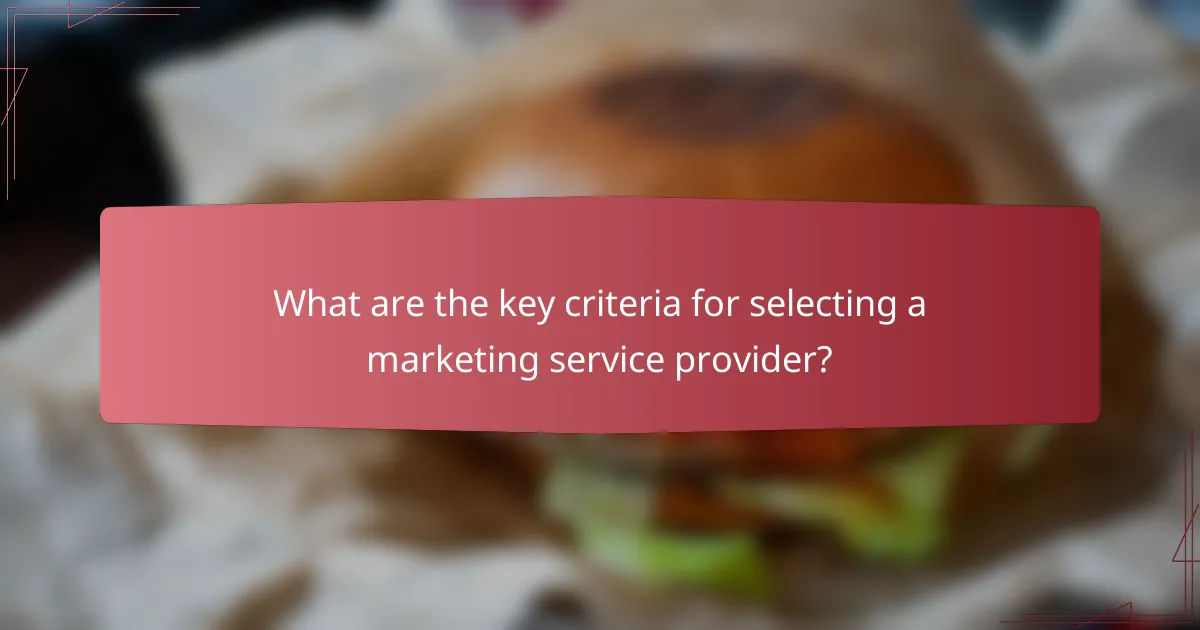
What are the key criteria for selecting a marketing service provider?
When selecting a marketing service provider, consider their expertise, proven results, and alignment with your business goals. Key criteria include experience in local markets, client testimonials, and case studies that demonstrate their effectiveness.
Experience in local markets
Choosing a provider with experience in local markets is crucial, as they understand regional consumer behavior and preferences. Look for agencies that have successfully executed campaigns in your area, as they will be more adept at navigating local regulations and cultural nuances.
For instance, a marketing service familiar with the European market may better tailor strategies to comply with GDPR regulations, while a provider experienced in the U.S. market might focus on different social media platforms. Assess their past work to ensure they have relevant local insights.
Client testimonials and case studies
Client testimonials and case studies provide valuable insights into a marketing service provider’s effectiveness and reliability. Look for detailed case studies that outline specific challenges, strategies implemented, and measurable outcomes achieved for previous clients.
Testimonials should ideally come from businesses similar to yours in size and industry. This can help you gauge whether the provider can deliver results that meet your expectations. A strong track record of satisfied clients often indicates a provider’s ability to adapt and succeed in various scenarios.

How do seasonal trends affect marketing budgets?
Seasonal trends significantly influence marketing budgets by dictating when and how much businesses should allocate for their campaigns. Understanding these trends helps companies optimize spending and maximize return on investment (ROI) during peak periods.
Holiday marketing strategies
Holiday marketing strategies often require increased budgets to capitalize on consumer spending spikes during festive seasons. Businesses typically allocate a larger percentage of their annual marketing budget—sometimes up to 30%—for campaigns around holidays like Christmas, Black Friday, and Valentine’s Day.
Effective holiday strategies include targeted promotions, festive-themed content, and leveraging social media to engage customers. Brands should plan campaigns well in advance to ensure they capture consumer interest and drive sales during these crucial times.
Seasonal service demand fluctuations
Seasonal service demand fluctuations can lead to varying marketing budget needs throughout the year. For instance, businesses in the travel and hospitality sectors may see demand peak during summer and winter holidays, necessitating higher marketing investments during these times.
To manage these fluctuations, companies should analyze historical data to predict seasonal trends and adjust their budgets accordingly. A flexible approach allows businesses to allocate resources effectively, ensuring they can meet consumer demand without overspending during off-peak periods.
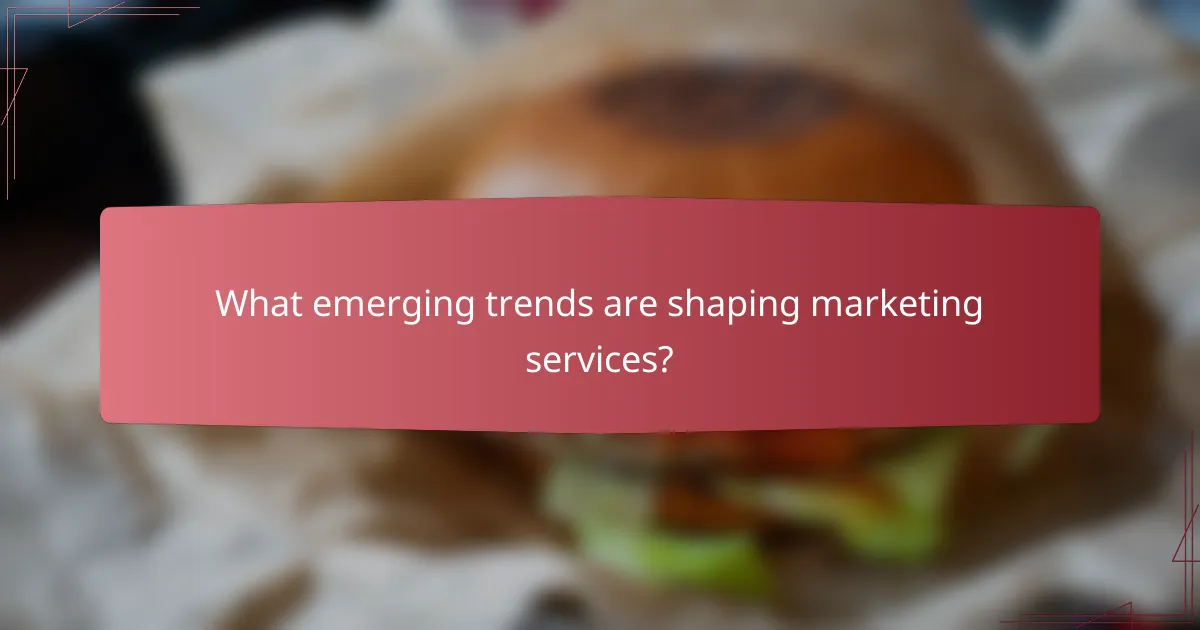
What emerging trends are shaping marketing services?
Emerging trends in marketing services are increasingly driven by technology and consumer behavior shifts. Key developments include the integration of artificial intelligence, the rise of personalized marketing, and the growing importance of data privacy.
AI in marketing automation
AI in marketing automation streamlines processes by utilizing algorithms to analyze data and optimize campaigns. This technology can enhance customer targeting, improve lead scoring, and personalize content delivery, making marketing efforts more efficient.
When implementing AI tools, consider the balance between automation and human oversight. While AI can handle repetitive tasks, human creativity remains essential for crafting compelling narratives and strategies. Common platforms include HubSpot, Marketo, and Salesforce, which offer various pricing tiers based on features.
To maximize ROI, focus on integrating AI tools that align with your specific marketing goals. Avoid over-reliance on automation; instead, use AI to augment your team’s capabilities. Regularly review performance metrics to adjust strategies and ensure that AI implementations are delivering the expected results.
